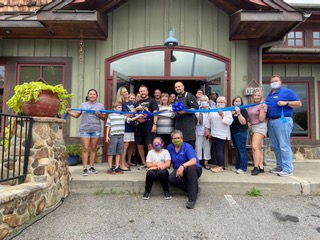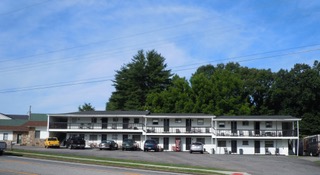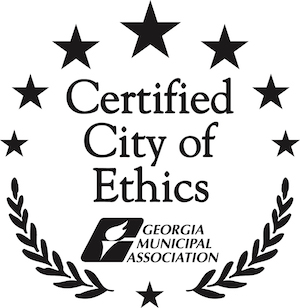
HOW IT WORKS
The purpose of the Rural Zone designation is to assist in the revitalization of our community by incentivizing new businesses to come to Downtown Hiawassee.
By creating new jobs, investing in commercial property,
and restoring old buildings through incentives; downtown entrepreneurs can move forward.
Revitalizing Underdeveloped Rural Areas
City of Hiawassee Economic Development 50 River Street Hiawassee, Georgia 30546 (706) 896-2202
www.HiawasseeGa.Gov
www.HiawasseeGa.Gov Contact: This email address is being protected from spambots. You need JavaScript enabled to view it.

Job Tax Credits
-
Must create two full-time equivalent jobs
-
$2,000 credit per new full- time equivalent job - not to exceed $40,000 credit per year
-
Eligible businesses include professional services or retail
-
Credit can be taken for five years as long as the jobs are maintained
Rehabilitation Tax Credit
-
Equivalent to 30% of qualified rehabilitation costs not to exceed $150,000
-
Credit should be prorated equally in three installments over three taxable years
-
Must create a minimum of two full-time equivalent jobs
Process to Apply
1. Certified Entity/Investor files Certification Form with local government contact
2. Local jurisdiction verifies the certified Entity/ Investor is located within the local Rural Zone and meets all local ordinances/licensing standards.
3. Local jurisdiction forwards certification form to the Department of Community Affairs
for acknowledgment and acceptance.
4. Once certified, acknowledged, and accepted, a copy will be provided to the applicant, the local jurisdiction, and the Department of Revenue. Attach certification to income tax return when credit is claimed.

Investment Tax Credit
This credit is for purchasing property downtown within the Rural Revitalization Zone.
Equivalent to 25% of the purchase price not to exceed $125,000
To claim this tax credit the investment property must be within the designated Rural Revitalization Zone and create two full-time equivalent jobs
Credit can be claimed over five years
RURAL ZONE
REQUIRED REHABILITATION STANDARDS
If the property being rehabilitated is within a designated Historic District subject to provisions specified by the community’s Historic Preservation Commission, satisfaction of the Historic Preservation Commission’s requirements will be constituted as meeting the required rehabilitation standards for the Rural Zone program. Documentation of compliance shall be provided by the local Historic Preservation Commission.
Should the Rural Zone or project area not be within a designated Historic District subject to provisions specified by the community’s Historic Preservation Commission, the project must comply with each of the following requirements. It will be incumbent upon the certified investor or certified entity, as well as the applicable local government with the Rural Zone designation, to document compliance with said standards. The applicable standards will be:
1. A property should be used for its historic purpose or be placed in a new use that requires minimal change to the defining characteristics of the building and its site and environment.
2. The historic character of a property should be retained and preserved, when applicable. The removal of historic materials or alteration of features and spaces that characterize a property shall be avoided unless other solutions are not deemed viable.
3. Each property should be recognized as a physical record of its time, place, and use. Changes that create a false sense of historical development, such as adding conjectural features or architectural elements from other buildings, shall generally be avoided.
4. Most properties change over time; those changes that have acquired historic significance in their own right should be retained and preserved.
5. Distinctive features, finishes, and construction techniques or examples of craftsmanship that characterize a property should be preserved.
6. Deteriorated historic features should be repaired rather than replaced, when practical. Where the severity of deterioration requires replacement of a distinctive feature, the new feature should match the old in design, color, texture, and other visual qualities and, where possible, materials
7. Chemical or physical treatments, such as sandblasting, that cause damage to historic materials should not be used. The surface cleaning of structures, if appropriate, should be undertaken using the gentlest means possible.
8. Significant archeological resources affected by a project should be protected and preserved, when at all
possible. If such resources must be disturbed, mitigation measures should be undertaken.
9. New additions, exterior alterations, or related new construction should not destroy historic materials that characterize the property. The new work should be differentiated from the old and should be compatible with the massing, size, scale, and architectural features to protect the historic integrity of the property and its environment.
10. New additions and adjacent or related new construction should be undertaken in such a manner that if removed in the future, the essential form and integrity of the historic property and its environment would be unimpaired.
RULES
OF
GEORGIA DEPARTMENT OF COMMUNITY AFFAIRS
CHAPTER 110-34 RURAL ZONE PROGRAM
Table of Contents
Purpose
Definitions
Eligible Applicants
Threshold Criteria for Boundaries and Designations Application for Designation
Rural Zone Tax Credits
Annual Requirements
Purpose
The purpose of the Rural Act is to amend Article 2 of Chapter 7 of Title 48 of the Official Code of Georgia Annotated to provide tax credit incentives to promote the revitalization of vacant rural Georgia downtowns by encouraging investment, job creation, and economic growth in long-established business districts by the designation of “Rural Zones”.
Authority O.C.G.A. §48-7-40.32
110-34-1-.02 Definitions
(1) 'Certified entity' means any eligible business which establishes a new location within
a Rural Zone on or after January 1, 2018, or any existing eligible business located
within a Rural Zone that expands its operations on or after January 1, 2018, and which: (a) Creates at least two new full-time equivalent jobs in a taxable year; and
(b) Has been certified by the Commissioner of Community Affairs as eligible to receive the Rural Zone tax credit based on established criteria in O.C.G.A. §48-7-40.32 and promulgated in these regulations by the Commissioner of Community Affairs.
(2) 'Certified investor' means an investor or investors who:
(a) Acquire and develop real estate within a designated Rural Zone; and
(b) Have been certified by the Commissioner of Community Affairs as eligible to receive the Rural Zone tax credit based on criteria established in O.C.G.A. §48-7-40.32 and
1
promulgated in regulations by the Commissioner of Community Affairs. Such certification shall be attached to the income tax return when the credit is claimed.
(3) 'Eligible business' means any establishment that is primarily engaged in providing professional services or in retailing merchandise and rendering services incidental to the sale of merchandise, including but not limited to the North American Industry Classification System Codes 31, 44-45, 54, and 72. Any establishment primarily engaged in activity not specifically referenced in the aforementioned NAICS code sections may seek a determination from the Commissioner of Community Affairs to ensure it will be deemed an eligible entity.
(4) 'Full-time equivalent' means an aggregate of employee hours worked totaling 40 hours per week, the equivalent of one full-time job, provided the work is performed by at least two people.
(5) 'Local government' means a county, municipality, or consolidated local government created pursuant to Article IX, Sections I, II, or III of the Georgia Constitution; applicable general state statutes; a local Act of the General Assembly; or such other method as was valid at the time of its creation.
(6) 'Maintained Job' means any new full-time equivalent job continued for all or part of the consecutive four-year period after its creation.
(7) 'Qualified rehabilitation expenditure' means labor and material costs associated with the rehabilitation of a certified investor property which:
(a) Complies with the state minimum standard codes and any applicable local codes; and (b) Has been certified by the Commissioner for the Department Community Affairs as eligible to receive the Rural Zone tax credit based on established criteria in O.C.G.A. §48- 7-40.32 and promulgated in regulations by the Commissioner for the Department of Community Affairs. Such certification shall be attached to the income tax return when the credit is claimed.
(8) 'Rural zone' means the same as a revitalization zone as specified in O.C.G.A. §48-7- 40.32 and means a specified geographic region that meets all criteria provided by this Code section and has been designated by the Commissioner of Community Affairs and the Commissioner of Economic Development to be in need of economic revitalization. There is no minimum or maximum size to the Rural Zone, but it shall meet all of the requirements set forth in O.C.G.A. §48-7-40.32.
(9) 'To Generate/Trigger Credits' means to meet all requirements in law and regulation for the Rural Zone tax credits allowed under Article 2 of Chapter 7 of Title 48 of the Official Code of Georgia Annotated, except for maintenance of full-time equivalent jobs in all or part of the subsequent four years after their creation.
(10) 'Year One' means that tax year in which sufficient new full-time equivalent jobs are created that, meeting the requirements of these regulations, entitle an eligible business to claim Rural Zone tax credits in years one through five after the creation of the full-time equivalent jobs.
2
(11) 'Years One Through Five' means the consecutive five-year period in which Rural Zone tax credits may be allowed for the new full-time equivalent jobs created in year one as well as the subsequent four years in which additional new full-time equivalent jobs may be created that may also qualify for Rural Zone tax credits.
Authority O.C.G.A. §48-7-40.32
110-34-1-.03 Eligible Applicants
(1) Eligible applicants under this program are municipalities, counties or consolidated governments with a population of 15,000 or less. The population estimates shall be based on the most recent U.S. Census Bureau’s American Community Survey population estimates. Once approved, communities will maintain the designation for the full term even if a new American Community Survey is conducted that reflects the population of the previously approved community above 15,000.
(2) All applicant communities must meet the criteria outlined in 110-34-1-.02(4) and be in compliance with the state requirements regarding comprehensive planning and reporting, Service Delivery Strategy, Government Management Indicators (GOMI), and the Report of Local Government Finances.
(3) If the applicant is not the municipality in which the program will take place, the application must include a resolution of support and commitment of cooperation from the applicable local government.
Authority O.C.G.A. §48-7-40.32
110-34-1-.04 Threshold Criteria for Boundaries and Designations
(1) Eligible applicants must have an existing historic commercial area.
(2) The boundaries of the proposed Rural Zone should take into consideration the economic distress criteria and should be contiguous parcels.
(3) The Commissioners for the Department of Community Affairs and the Department of Economic Development are authorized to designate a specified area as a Rural Zone, enabling new and established businesses and new business investments in the zone to qualify for Rural Zone tax credits.
(4) The Commissioners for the Department of Community Affairs and the Department of Economic Development may designate up to ten Rural Zones in any given year; provided, however, there shall not be more than 50 Rural Zones in existence at the same time. This designation shall last for five consecutive years upon approval of the Commissioners.
3
Authority O.C.G.A. §48-7-40.32
110-34-1.-05 Application for Designation
(1) Eligible applicants must apply for Rural Zone designation under this program in a format and manner prescribed by the Department of Community Affairs. Applications may be submitted in writing to the Department at:
Georgia Department of Community Affairs Rural Zone Program Community Development & Finance Division 60 Executive Park South, NE
Atlanta, Georgia 30329-2231
(2) To be eligible to apply for such designation, local governments must meet all of the following criteria:
(a) Have a population of less than 15,000 based upon the most recently published U.S. Census Bureau’s American Community Survey’s most recent population estimates;
(b) Proof of economic distress based on poverty rate, vacancy of the downtown area, or blight;
(c) Possess a concentration of historic commercial structures at least 50 years old within the targeted area;
(d) Submit a feasibility study or market analysis identifying the business activities which can be supported in the targeted area; and
(e) Develop a master plan or strategic plan designed to assist private and public investment.
(3) Local commitment – Eligible applicants demonstrating strong local commitment to the redevelopment of downtown may make a compelling case for designation. Such local commitment may include, but not be limited to, partnerships and initiatives with local banks or other financial institutions, development authorities or through locally developed plans.
(4) The Department of Community Affairs will develop application guidelines and instructions. Applications will include but not be limited to the following:
(a) A cover letter to the Commissioner of Community Affairs and the Commissioner of Economic Development requesting designation must be prepared and signed by an authorized representative of the local government applying for the Rural Zone designation. If the applicant is not the municipality in which the program will take place, concurrence must be received from the applicable local government.
(b) Economic Distress
4
1. Documentation submitted with the request must prove economic distress based on poverty rate, blight or vacancy in the downtown area.
(c) Maps
1. Digital GIS files detailing the proposed Rural Zone (i.e. shapefiles or geodatabase feature classes with prj). Applicant may submit maps via CD or Internet file transfer program provided by DCA. Digital maps should include individual boundary polygons as listed below:
(i) Parcel file (just the parcels in the proposed Rural Zone) that includes parcel ID number; (ii) Boundary file for the proposed Rural Zone; and
(iii) Identification of historic structures (fifty years or greater), vacant parcels and blighted parcels.
(d) Feasibility Study/Market Analysis – A feasibility study or market analysis of the downtown area and businesses which can be supported in the target area is required. This analysis shall evaluate the existing mix of businesses and industries within the community/proposed Rural Zone and determine what businesses/industries have a strong likelihood of succeeding within the proposed zone.
(e) Strategic Plan/Master Plan – Submission of a plan is required to help the community guide public and private investment is required. This plan shall conform with the requirements set forth in the application by the Department of Community Affairs.
Authority O.C.GA. Sec. 50-8-2
110-34-1-.06 Rural Zone Tax Credits
(1) For eligible certified entities and certified investors within a currently designated Rural Zone, tax credits may be earned in accordance with O.C.G.A. 48-7-40.32 and accompanying regulations. Nothing in this regulation shall be construed as authorization for certified entities or certified investors to claim multiple job tax credits for the same jobs or to claim multiple investment or rehabilitation credits for the same investment or rehabilitation expenses.
(2) Before claiming the Rural Zone tax credit, a certified entity or certified investor must apply for a certification in a format prescribed by the Department of Community Affairs that the business location where jobs are being created or the investment has been made, including the rehabilitation credit, is located within a currently designated Rural Zone.
(a) The certification application must contain the address and parcel number;
5
(b) The certification application must verify the baseline number of jobs prior to the eligibility for the credit, as well as employment during the year for which credits are being claimed.
(c) The certified entity or certified investor must file the certification with the local government’s contact person for the Rural Zone. The local jurisdiction must then certify that the certified entity or certified investor location is within the Rural Zone, and that the applicant meets all local ordinances and licensing standards.
(d) The certification must then be forwarded to the Department of Community Affairs for acknowledgment.
(e) Once certified and acknowledged, a copy will be provided to the applicant entity or investor, the local jurisdiction and the Department of Revenue.
(3) Certified entities shall receive the Rural Zone tax credit for five years beginning with the first taxable year in which new full-time equivalent jobs are created within a designated zone and for years two, three, four, and five of the taxable years immediately following, provided the new full-time equivalent jobs are maintained for each year the tax credit is claimed.
(a) Each new full-time equivalent job created will be eligible for a $2,000.00 annual income tax credit. The amount of credit claimed by each certified entity shall not exceed $40,000.00 per taxable year.
(b) The number of new full-time equivalent jobs shall be determined by comparing the monthly average of full-time equivalent jobs subject to Georgia income tax withholding for a given taxable year with the corresponding period of the prior taxable year; provided, however, a certified entity which begins operations during the taxable year may be certified by the Commissioner for the Department of Community Affairs to base initial eligibility on a period of less than 12 months.
(c) This income tax credit shall not be allowed during a year if the net employment increase falls below the number required by subparagraph 110-34-1-.02(1)(A) of these regulations.
(d) Any credit generated and utilized in years prior to the year in which the net employment increase falls below the number required by subparagraph 110-34-1- .02(1)(A) of these regulations shall not be affected.
(e) Tax credits for the taxes imposed under Article 2 of Chapter 7 of Title 48 shall be awarded for additional new full-time equivalent jobs created by an eligible business qualified under O.C.G.A. §48-7-40.32 for the four years immediately following an eligible Year One. Additional credits are allowed for additional new full-time equivalent jobs if the eligible business already qualifies for the Rural Zone tax credit based on full-time equivalent job increases in year one. Additional new full-time equivalent jobs shall mean those full-time equivalent jobs created in year two that increase an employer’s count of full-time equivalent jobs above the number of full-time equivalent jobs in year one; and beyond with years three through five, etc. Additional new full-time equivalent jobs may
6
only be created in years two through five, including all subsequent years two through five initiated by a qualifying increase of full-time equivalent jobs.
(f) A subsequent year one and years two through five are created when an eligible business creates the required threshold number of new full-time equivalent jobs.
1. Subsequent periods of eligibility are subject to all the provisions of these regulations and O.C.G.A. §48-7-40.32.
2. Rural Zone Tax Credits generated under previous periods of eligibility will not be affected as long as the full-time equivalent jobs are maintained. But no new Rural Zone tax credits may be generated under previous periods of eligibility after a subsequent period of eligibility has begun.
3. If an eligible business creates the required number of full-time equivalent jobs to establish a subsequent period of eligibility, but does not meet other requirements in law or regulation, no subsequent period of eligibility is established. In addition, such full- time equivalent jobs may not be counted as additional full-time equivalent jobs under a previous period of eligibility.
(4) Certified investors who acquire and develop property in a Rural Zone on or after January 1, 2018, shall receive the Rural Zone tax credit, subject to the following:
(a) Certified investors shall demonstrate a property's ongoing commercial benefit as follows:
1. An eligible business is located in the investment property and creates a minimum of two full-time equivalent jobs and maintains employment levels equal to or greater than such levels for each year the tax credit is claimed; or
2. An eligible business is located in the investment property and qualifies to receive the tax credit pursuant to subsection (c) of O.C.G.A. §48-7-40.32; or
(b) The amount of the tax credit per project shall be 25 percent of the purchase price and shall not exceed $125,000.00; provided, however, that the entire credit shall not be taken in the year in which the property is placed in commercial service but shall be prorated equally in five installments over five taxable years, beginning with the taxable year in which the property is placed in service; and
(c) A certified investor shall be allowed to preserve the Rural Zone tax credit for up to seven years from the date of initial eligibility in the event the commercial requirement in paragraph (1) of this subsection is not satisfied in consecutive years.
(5)A certified investor or certified entity with qualified rehabilitation expenditures on or after January 1, 2018, shall receive the Rural Zone tax credit for three years beginning with the year the property is placed in service.
(a) The amount of the tax credit per project shall be 30 percent of the qualified rehabilitation expenditures and shall not exceed $150,000.00; provided, however, the entire credit shall not be taken in the first year, but shall be prorated equally in three installments over three taxable years, beginning with the taxable year in which the property is placed in service.
7
(b) The business shall create a minimum of two full-time equivalent jobs and maintains employment levels equal to or greater than such levels for each year the tax credit is claimed.
(c) A certified investor or certified entity shall meet certain historic preservation standards in order to be qualified to receive the Rural Zone tax credit. The standards shall be identified with the assistance of the Department of Natural Resources' Historic Preservation Division and placed on the agency’s website by the Department of Community Affairs.
(d) A taxpayer who is entitled to and takes credits provided by O.C.G.A. §48-7-40.32 for a project shall not be allowed to utilize the same qualified rehabilitation expenditures to generate any additional state income tax credits, including, but not limited to, the state income tax credit for rehabilitated historic property administered by the Department of Natural Resources' Historic Preservation Division.
(e) For projects utilizing credits under O.C.G.A §48-7-40.32, direct jobs for which credits are received shall not be eligible toward qualifying for any other job-related state tax credits provided under the Official Code of Georgia (including but not limited to OZ, Georgia Jobs Tax Credit, Military Zone, Less Developed Census Tract, etc.).
(f) As a general rule, the teardown of facilities within a Rural Zone will not be permitted to claim rehabilitation credits. However, in rare cases, exceptional circumstances may warrant credits being earned at the discretion of the Commissioner of Community Affairs.
(6)In no event shall the amount of the tax credits allowed by O.C.G.A. §48-7-40.32 for a taxable year exceed a certified entity's or certified investor's state income tax liability. Any credit claimed under O.C.G.A. §48-7-40.32 by a certified entity or certified investor but not used in any taxable year may be carried forward for ten years from the close of the taxable year in which the credit is claimed. No such credit shall be allowed by the taxpayer against prior years' tax liability.
(7)Any tax credits earned under O.C.G.A. §48-7-40.32 are nontransferable.
Authority O.C.G.A. §48-7-40.32
110-34-1-.07 Annual Requirements
(1) On an annual basis on or by January 31st and in a format to be provided by the Department of Community Affairs, the local government shall report on the Rural Zone’s activity for the most recent year:
(a) A narrative description of steps the local government has taken to facilitate business development within the Rural Zone within the prior year.
(b) Private activities that have spurred revitalization efforts within the zone. (c) Other information as required by the Department of Community Affairs.
8
(2) Certified entities and certified investors shall report to the Department of Revenue annually on forms and at times as directed by the agency.
(3) The Commissioners for the Department of Revenue and the Department of Community Affairs shall have the authority to require reports and promulgate regulations as needed in order to perform their duties under O.C.G.A. §48-7-40.32.
(4) A local government’s failure to provide annual reports to the Department of Community Affairs shall result in the local government being ineligible for any funding administered by the Department of Community Affairs until such time that the jurisdiction is current with the filing of all Rural Zone’s annual reports.
(5) During the period of designation, each local government with a designated Rural Zone shall participate in annual training by the Department of Community Affairs to assist in the revitalization within the community. This training may be in the form of in-person meetings, webinars, or other methods implemented by the department. Failure to participate in annual trainings shall result in the local government being ineligible for any funding administered by the department until such time that the jurisdiction completes required training.
O.C.G.A. §48-7-40.32 shall stand automatically repealed on December 31, 2027, unless reauthorized by the General Assembly prior to such date.
Authority O.C.G.A. §48-7-40.32
9

